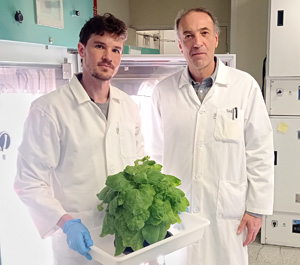Plants against SARS-CoV-2
Scientists at the Plant Molecular and Cell Biology Research Institute obtain nanoparticles coated with antibodies against the coronavirus from plant biofactories
[ 27/11/2023 ]
Using plants as 'biofactories' to produce nanoparticles as a vehicle for drugs. This is what a team from the Plant Molecular and Cell Biology Research Institute (IBMCP), a joint centre of the Consejo Superior de Investigaciones Científicas (CSIC) and the Universitat Politècnica de València (UPV), in collaboration with the Instituto de Biología Integrativa de Sistemas (I2SySBio), of the CSIC and the Universitat de València, has achieved. Specifically, they have created nanoparticles with small single-chain monoclonal antibodies (nanobodies) that act against the protein that envelops the SARS-CoV-2 coronavirus. These nanoparticles could be used as a reagent in diagnostic tests and, after evaluation, as a drug to neutralise the virus infection. The results are published in the Plant Biotechnology Journal.
The research group led by José Antonio Darós at the IBMCP used plants of the Nicotiana benthamiana species to produce nanoparticles coated with small single-chain monoclonal antibodies, also called 'nanobodies.' Antibodies are essential molecules of the immune system, capable of binding to any foreign structure to trigger other mechanisms that destroy potentially dangerous elements for the organism (viruses, bacteria, tumour cells...). Specifically, the nanobodies obtained in this work act against the S protein of SARS-CoV-2, the 'key' that allows the coronavirus to infect cells.
Obtaining drugs from plants dates back to the dawn of humanity. The process is being modified, turning plants into factories to produce compounds of interest. "In the same way that a compound produced naturally by a plant can be extracted, we induce the production of the molecule we want, in this case, nanoparticles coated with nanobodies," explains José Antonio Darós, CSIC research professor at the IBMCP. To do this, they use the ability of viruses to infect plants quickly and systemically by inserting the gene encoding the antibody they want to produce into the virus genome.
"Instead of producing these nanobodies as individual molecules, in this project, we developed the production of nanoparticles, molecular structures whose scale is nanometric, which serve as a support for the presentation of these antibodies," reveals Darós. The nanoparticle used is the viral particle itself, whose structural protein is fused to an antibody. "In this way, when these structural proteins self-assemble, we obtain multivalent macromolecules, which have hundreds of repeats of the antibody in question," he describes. This increases their capacity for action since "multivalent antibodies show greater avidity towards their target and are therefore more potent in neutralising it.
Advantages of using plants as biofactories
The researchers say this system of producing multivalent nanoparticles in plant biofactories could be used to make any nanobody of interest. "The nanoparticles developed in this work could be used as a reagent in coronavirus diagnostic tests, such as widely marketed test strips. In a later step, their ability to be also used as therapeutic agents capable of inhibiting viral propagation could be evaluated," comments Fernando Merwaiss, a postdoctoral researcher at IBMCP and co-lead author of the study.
As for the advantages of using plants as biofactories to generate compounds of pharmacological interest, in addition to the low cost of production (plants only need sunlight, water, carbon dioxide, and some inorganic nutrients to grow), "it has other advantages such as the unlikelihood of contamination with human pathogens, the ease of scaling up production and the ability to perform post-translational modifications similar to those of mammalian cells," Merwaiss remarks. In addition, the method developed by the IBMCP and I2SysBio team adds the possibility of producing hundreds of nanobodies clustered on the same multivalent macromolecule, which significantly increases their capacity for action.
Reference:
Fernando Merwaiss, Enrique Lozano-Sanchez, João Zulaica, Luciana Rusu, Marta Vazquez-Vilar, Diego Orzáez, Guillermo Rodrigo, Ron Geller and José-Antonio Daròs, Plant virus-derived nanoparticles decorated with genetically encoded SARS-CoV-2 nanobodies display enhanced neutralising activity, Plant Biotechnology Journal. DOI: 10.1111/pbi.14230
Outstanding news
 Study a degree at the best technological university in Spain
Study a degree at the best technological university in Spain
The Universitat Politècnica de València is ranked number 1 among Spanish technology universities, according to the Shanghai ranking
 Highly Cited Researchers 2025
Highly Cited Researchers 2025
Avelí Corma, Juan Bisquert and Luis Guanter, the international scientific elite with a Universitat Politècnica de València hallmark
 Historic Milestone in Spanish Higher Education
Historic Milestone in Spanish Higher Education
The UPV inaugurates the Beihang Valencia Polytechnic Institute, the first Spanish university center in China
 Study in English
Study in English
The UPV offers eight degrees, 16 master's and 650 courses in English for the 2025-26 academic year
 A Latin Grammy... with the UPV hallmark
A Latin Grammy... with the UPV hallmark
'Music teaches us to listen and live together,' says Rafael Serrallet, Doctor of Music at the UPV, awarded in Las Vegas as the author of the Best Instrumental Album of 2025
 THE Impact Ranking
THE Impact Ranking
The UPV, the Spanish university with the greatest social and economic impact in the world

